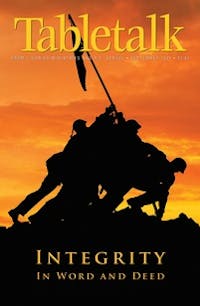
Request your free, three-month trial to Tabletalk magazine. You’ll receive the print issue monthly and gain immediate digital access to decades of archives. This trial is risk-free. No credit card required.
Try Tabletalk NowAlready receive Tabletalk magazine every month?
Verify your email address to gain unlimited access.
What will people say about me after I die?” Have you ever asked yourself that question? It is a question that has haunted me for years, and it is one of the most captivating questions anyone can ask himself. In truth, it would do us good to ask ourselves such questions with some frequency: “What will I contribute to the world, the church, and the kingdom of God before I die?” Such questions, the hard questions concerning death, are in fact the very questions of life. In asking ourselves questions about the reality of our lives in the eyes of the analytical world, we may in turn provide ourselves with answers that change the way we live, both before the eyes of men openly and before the eyes of God privately.
Throughout history, men, both great and small, have shaped the world around them, and wherever I travel, I am always on the lookout for the burial places of great men. The graves of history’s victors and villains fascinate me to no end. And whether they were penned by friends or by foes, the epitaphs on gravestones reveal the sentiments of those who knew the departed, leaving the legacy of their opinions engraved in stone for generations to come.
A few days ago I was in England and made a brief visit to London’s St. Paul’s Cathedral, wherein is found the epitaph: “Sacred to the memory of General Charles George Gordon who at all times and everywhere gave his strength to the weak, his substance to the poor, his sympathy to the suffering, his heart to God.” Truly, a magnificent legacy to which the world is able to bear witness as scores of visitors ponder the epitaph of a mere man whose character is enshrined in accordance with the opinions of mere men. And while such opinions should not be disregarded, they are only opinions, opinions of men who cannot feel the hearts of others and who certainly cannot see the actions of others at all times and in all places.
It is only the Lord who knows us for who we truly are, and just as we cannot hide from His presence, neither can we fool Him by closing our eyes and pretending He’s not there. For just as David prayed, “As for me, You uphold me in my integrity, and set me before Your face forever” (Ps. 41:12 nkjv) so we must earnestly seek to be men and women of integrity, not merely before the face of men but before the face of God, coram Deo. For what matters is not simply how men regard us after we die, but how God regards us in this life and the next.
